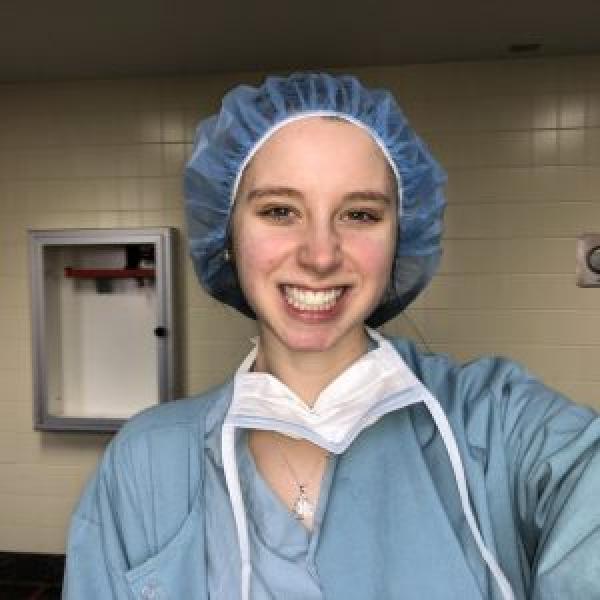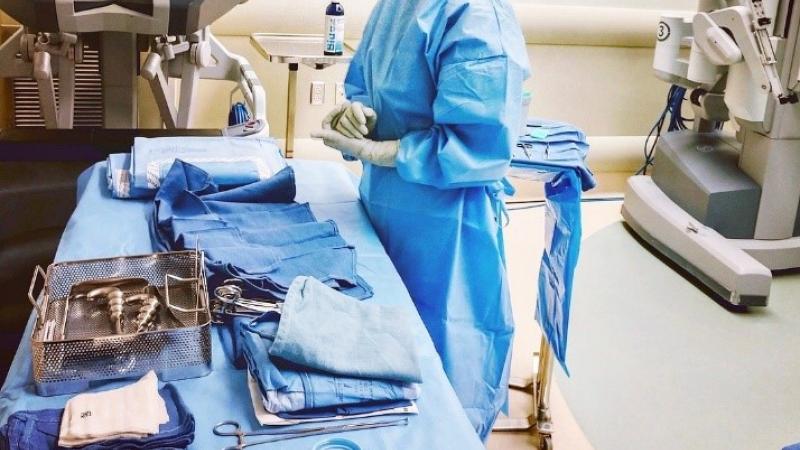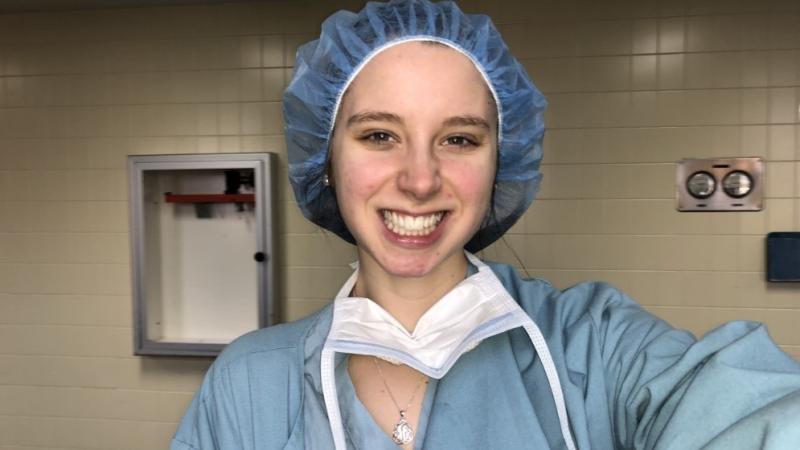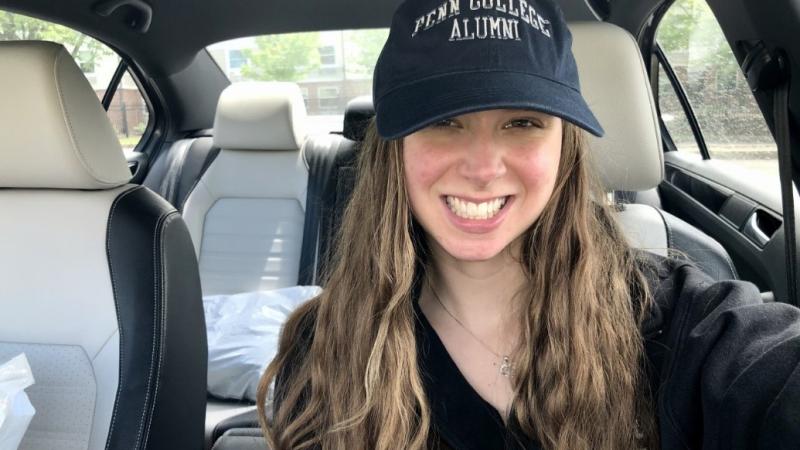Surgical technologists expect the unexpected in the OR
Published 06.26.2020

by Alexis Ashby
Applied health studies graduate
As a certified surgical technologist Alexis Ashby keeps a vigilant eye to keep patients safe in the operating room. She is grateful to impact lives, even if her patients are unaware.
The 2018 surgical technology graduate, who added a bachelor’s degree in applied health studies 2020, offers an inside glimpse into her work.
What does your work as a surgical technologist entail?
Working as a surgical technologist entails going to work every day and not knowing what to expect. There are certain basic principles of surgical technology that can be anticipated to occur each shift: you will go to the OR (operating room), you will collaborate with a surgical team, create and maintain a sterile field, and be that patient’s advocate when they are unable to speak for themselves.
Getting into the details, for me, that means checking the surgical supplies and instrumentation picked for each case prior to setting up. It means knowing the specifics of what every doctor prefers and making sure I have it available, having the knowledge to drape (and occasionally prep) a surgical site with or without assistance, and more than anything, it means anticipating each step of the surgical procedure, from incision to dressings, and being consciously aware of sterile technique throughout, with the surgical conscience to know that you are responsible for monitoring others’ sterile technique, and that any break can result in an infection to your patient if you do not correct it.
Every case is different, and that is part of the excitement of working in the OR, but whether it is straightforward, like a carpal tunnel, or unique, like an emergent exploratory laparotomy, our main responsibility as surgical technologists is to be hyper-aware for the sake of our patient and their family.
Do you have a specialty?
I would say I do about 90% of my work in orthopedics. Honestly, going into orthopedics is terrifying – but in a good way! These procedures tend to be lengthier and at a higher pace than other specialties, and I can honestly say I have developed skills of speed, dexterity, hand-eye coordination and intuition, above all else, to a level that I never realized I could accomplish.
In a typical week, I do numerous total joint replacements, including knees, hips and shoulders, fixations and stabilizations of fractures, and, probably my favorite, spinal fusions. What I like about orthopedics is that you develop a certain comradery with the doctors, assistants, nurses, X-ray techs and even sales reps. These surgeries can be high-stress and chaotic, but everybody understands their role and how it needs to be done so that we can accomplish our goals efficiently and safely.
One last thing about orthopedics: You can never truly anticipate how long a case can take; we can replace a hip in an hour, or spend five hours setting a fracture, or eight hours in a spinal fusion – so you have to utilize those bathroom breaks when you get one!
Have you had any particularly rewarding experiences at work?
I have done tracheotomies in the ICU, emergency bowel resections at 3 in the morning, and leg amputations on those too young to be without. As a surgical technologist, you are a part of an amazing system of saving lives and impacting those who are not always aware of your impact on their health and well-being.
One particular experience that comes to mind when I think about this question is a little different from my typical days, though. Organ harvests come in sporadically and without preparation, meaning that whoever is working that shift is on that case.
I was still in orientation and was only in the room really to observe the ebb and flow of these unique cases, but when they requested an additional set of hands, I was ready to scrub in. We worked from easily 2200 (10 o’clock) that night to nearly 0600 (6 o’clock) that next morning without a break, without a pause, because sometimes time simply does not allow that. We ran on adrenaline and whatever caffeine was still in our system from the beginning of the shift, and when I sat down afterward, after hours of being on my feet, I was truly amazed at the mentality and focus that one is able to achieve when a case requires it. It was such a moment of self-satisfaction, proving that I was capable of the endurance and mindset necessary to be a surgical technologist when I was just starting out.
A couple weeks later, the OR received a letter from Gift of Life describing the lives that had been impacted by our efforts, those who had been given a second chance by somebody who no longer needed those organs. It was that impact, that knowing that people’s lives were ultimately changed for the better because of what we accomplished that night, that makes this job truly rewarding.
Your patients are often not able to express their gratitude. What makes up for that?
To be frank, every moment of being in the room makes up for that. You don’t become a surgical technologist with the intentions of being given gratitude for the work you do. It’s almost a running joke, actually. But when a patient comes in the room and looks you in the eye, and you see the nervousness or fear on their expression, that moment right before the anesthesia hits, or sometimes even when they are just waking up after, is all the gratification that I need.
When I am not scrubbed in, I like to stand by my patients and hold their hand or smile at them as we prepare them for surgery or to leave the room after. Sometimes they smile back or say thank you, and it’s those little moments that make me know that my job is worthwhile, and that they appreciate the care they are about to receive.
Any advice for surgical technology students?
Well, as my instructor told me on my first day of clinical rotations: It does not matter how much you are able to do today – just don’t pass out!
But in all seriousness: Don’t be discouraged by a bad day, a bad case or even just a poor preceptor. There may be days where you are so frustrated you could cry because you just aren’t “good enough” to scrub cases. You may feel embarrassed over the mistakes you make. But the one thing that always got me through surgical technology rotations was the knowledge that everybody (and I mean EVERYBODY) has done something similar before.
Take each mistake as a memory and an opportunity to improve yourself next time. Don’t be fearful for the next time you scrub that case. Be optimistic to prove that you have improved since the last time, that you are still learning and bettering your skills every day. I assure you, we do so many cases a week, even though a particular experience may be ingrained in your mind, we may not even remember it the next time we see you.
And one last thing: Don’t be afraid to take a moment to breathe. Learning to work at such a high speed with a whole new skillset can be overwhelming, and once that hits, you just forget everything you know that you know. So take each case one step at a time, and don’t give up on yourself for needing a minute to collect your thoughts.
What traits do students need be successful surgical technologists?
To be successful, I think it requires a certain drive, confidence and resilience. By this, I mean you have to be committed to an environment of constant learning; you have to strive to be independent but be capable of admitting your mistakes.
More than that, the OR can be a tough environment. It is not for the faint of heart. My preceptors and instructors always told me to not be pushed around, because it can be a very tough environment to step into if you are not confident, but you also have to know that you cannot take criticism to heart.
It can take a while to develop trust from your colleagues in the OR, so I believe it is integral to have confidence in your abilities that you belong in this environment and to utilize criticism for your own improvement instead of allowing yourself to be discouraged or upset.
Even after being in the OR for more than two years, I still make mistakes from time to time, and I definitely don’t know everything, but now I laugh at myself and correct these inadequacies for next time. It is all about mindset, really!
What do you love about your work?
It might sound strange, but I love the thrill of emergency cases. They can be incredibly stressful, and I definitely do not know every doctor’s preferences, but there are basic supplies that I know I will need, and it truly is just figuring out the rest as you go.
I know I will need cautery, sponges and clamps. Everything else comes as we progress, because sometimes you do not know what to expect when you open these patients.
I have done emergency fasciotomies listening to DMX, and I have done cases where we looked inside and there was nothing more we could do to save this patient. To learn and see certain landmarks, structures and malignancies within the body is a humbling experience.
Every time I do cases such as these, I find myself appreciative for my life and grateful for the opportunity to save somebody else’s. That is without a doubt the coolest part of my job.
How did Penn College help prepare you to excel as a surgical technologist?
Penn College helped prepare me to excel as a surgical technologist by not only giving me every opportunity to train in a clinical setting, but by really caring about the skills that I believed needed the most enhancement throughout my training.
Being a student representative for the Surgical Technology Advisory Committee allowed me to see firsthand how the surgical technology board and directors structured their teaching around student feedback and results.
My instructor went out of his way to ask what worked best for our learning preferences and how he could improve his class structure toward our success.
More than that, my clinical advisor took the time to speak to my peers and me regarding our strengths and went out of her way each week to make sure we were assigned adequate case placements throughout our clinical rotations.
I believe Penn College and my wonderful instructors took the initiative to care about my development, and that support allowed me to learn to be the best surgical technologist that I and they believed I could be.
Overall, I have heard and seen nothing but positive commentary regarding the excellent students Penn College produces as surgical technologists, and I am proud to be one of them.



